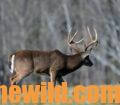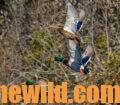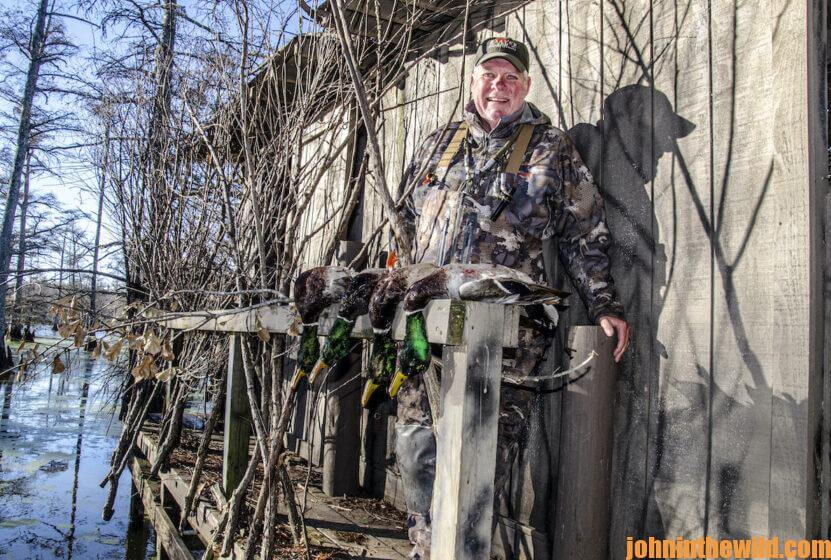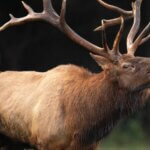Editor’s Note: Ducks have come to Beaver Dam on a 1,500-acre oxbow lake, south of Memphis, Tennessee, near Dundee and Tunica, Mississippi, 38 miles from the Mississippi River for eons. But harvesting ducks isn’t the only reason hunters flock there. More importantly, a trip to Beaver Dam is a step back into waterfowling history that enables you to go home with memories that last forever. Today, a portion of this lake is privately owned by Mike and Lamar Boyd and surrounded by corn, soybean and rice fields that draw in ducks. It’s historically been a great place to catch crappie and bass too with its 1-1/4 miles of open lake surrounded by standing cypress trees and cypress swamps on both ends of the lake. (All Live Waterfowl Photos Courtesy of George Lee Photography)
 In the early 1800s, steamboats ferried hunters from Memphis, Tennessee, down to Beaver Dam to hunt waterfowl – ducks, geese and swans – with local landowners – primarily on Dr. Owens’ land. They’d then travel by train to the area, and Dr. Owens would send a mule-drawn wagon to pick-up the hunters and bring them to Beaver Dam where they‘d pitch camp and live in tents. Then in the mid-1980s, a railroad was constructed that came to Beaver Dam Lake. Hunters from Memphis would bring their bags full of hunting clothes and their guns and shells to downtown Memphis, ride the limb dodger (train) down to Beaver Dam and walk across the road. The hunters decided they needed a more-permanent structure than tents, so, they built a cypress wood house where they could cook, eat and sleep before and after waterfowl hunts. Several years later, a big storm blew down a pecan tree that destroyed the camp house. But, they rebuilt another club house.
In the early 1800s, steamboats ferried hunters from Memphis, Tennessee, down to Beaver Dam to hunt waterfowl – ducks, geese and swans – with local landowners – primarily on Dr. Owens’ land. They’d then travel by train to the area, and Dr. Owens would send a mule-drawn wagon to pick-up the hunters and bring them to Beaver Dam where they‘d pitch camp and live in tents. Then in the mid-1980s, a railroad was constructed that came to Beaver Dam Lake. Hunters from Memphis would bring their bags full of hunting clothes and their guns and shells to downtown Memphis, ride the limb dodger (train) down to Beaver Dam and walk across the road. The hunters decided they needed a more-permanent structure than tents, so, they built a cypress wood house where they could cook, eat and sleep before and after waterfowl hunts. Several years later, a big storm blew down a pecan tree that destroyed the camp house. But, they rebuilt another club house.
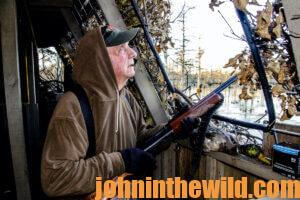 Most members of the group were successful businessmen with one of the original members, Miles Buckingham, Nash Buckingham’s father. Nash Buckingham grew up hunting Beaver Dam and became a well-known writer and author. The stories that Nash wrote in the Nashville paper, the “Tennessean,” and the books he wrote like, “De Shootinest Gent’man & Other Tales” were read widely across the nation. Mike Boyd’s farm includes a portion of Beaver Dam, and he says, “God made Beaver Dam, and Nash Buckingham made Beaver Dam famous as a waterfowl-hunting destination.”
Most members of the group were successful businessmen with one of the original members, Miles Buckingham, Nash Buckingham’s father. Nash Buckingham grew up hunting Beaver Dam and became a well-known writer and author. The stories that Nash wrote in the Nashville paper, the “Tennessean,” and the books he wrote like, “De Shootinest Gent’man & Other Tales” were read widely across the nation. Mike Boyd’s farm includes a portion of Beaver Dam, and he says, “God made Beaver Dam, and Nash Buckingham made Beaver Dam famous as a waterfowl-hunting destination.”
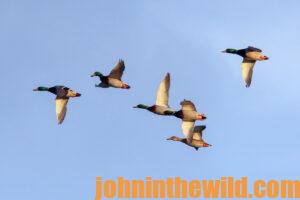 Beaver Dam was hunted almost daily throughout waterfowl season for many years. Even with all the hunting pressure on the lake, the waterfowl population held-up well, due to the habitat and the agriculture around Beaver Dam for the ducks to eat. According to Mike Boyd, “We can hunt out of our blinds every day of the season. There aren’t many waterfowl areas that can take as much hunting pressure as Beaver Dam, and hunters still take limits of waterfowl.
Beaver Dam was hunted almost daily throughout waterfowl season for many years. Even with all the hunting pressure on the lake, the waterfowl population held-up well, due to the habitat and the agriculture around Beaver Dam for the ducks to eat. According to Mike Boyd, “We can hunt out of our blinds every day of the season. There aren’t many waterfowl areas that can take as much hunting pressure as Beaver Dam, and hunters still take limits of waterfowl.
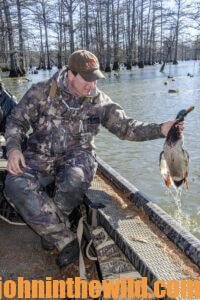 “The ducks at Beaver Dam are on the Mississippi Flyway and have been coming down the flyway to Beaver Dam for hundreds of years. More than 325 bird species fly south from Canada and the northern U.S. on this flyway each year. An advantage we have at Beaver Dam is that we not only can depend on cold fronts to bring ducks down from the north, but when our area has warm fronts moving up from the south, that pushes the ducks back up north on the flyway. So, we have flights of ducks coming in on warm fronts and cold fronts. During duck season, we have quite a good mixture of cold and warm fronts moving through our area.”
“The ducks at Beaver Dam are on the Mississippi Flyway and have been coming down the flyway to Beaver Dam for hundreds of years. More than 325 bird species fly south from Canada and the northern U.S. on this flyway each year. An advantage we have at Beaver Dam is that we not only can depend on cold fronts to bring ducks down from the north, but when our area has warm fronts moving up from the south, that pushes the ducks back up north on the flyway. So, we have flights of ducks coming in on warm fronts and cold fronts. During duck season, we have quite a good mixture of cold and warm fronts moving through our area.”
Mike Boyd, who’s been guiding hunters to waterfowl at Beaver Dam for 40 years, explains, “I’ve been hunting Beaver Dam for more than 50 years. Like most little boys who lived in the country back then, there wasn’t much for me to do besides hunt, fish and play out in the yard. But there was a man who worked for my grandfather and my uncle on our farm who was a very-proficient fisherman, trapper and waterfowl hunter. He took me duck hunting any time I wanted to go, and he’d sit with me as long as I wanted to hunt and then take me back home. That’s how my family started Beaver Dam Hunting Services.”
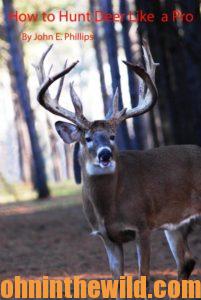 To learn more, you can visit the Boyds’ website at https://www.beaverdamducks.com/; call Mike Boyd at 662-363-6288 or email him at bbrdam@gmail.com; or, call Lamar Boyd at 662-910-0102 or email him at beaverdamducks@gmail.com.
To learn more, you can visit the Boyds’ website at https://www.beaverdamducks.com/; call Mike Boyd at 662-363-6288 or email him at bbrdam@gmail.com; or, call Lamar Boyd at 662-910-0102 or email him at beaverdamducks@gmail.com.
For more information about John E. Phillips’ hunting books, visit www.amazon.com/author/johnephillips. To learn more about hunting deer, check out John E. Phillips’ book, “How to Hunt Deer Like a Pro,” available in Kindle, print and Audible versions, at (http://amzn.to/YpoQHA). You may have to copy and paste this link into your browser. (When you click on this book, notice on the left where Amazon says you can read 10% of the book for free, and you can hear 10% for free). On the right side of the page and below the offer for a free Audible trial, you can click on Buy the Audible book. Go to
https://www.amazon.com/gp/product/B00AN7GDW4/ref=dbs_a_def_rwt_bibl_vppi_i47 to learn about John and Denise Phillips’ cookbook, available in Kindle and print, “The Best Wild Game and Seafood Cookbook” that includes an entire chapter on bird recipes, including recipes for their favorite duck dishes. 
Tomorrow: Where Do Beaver Dam Ducks Originate?

